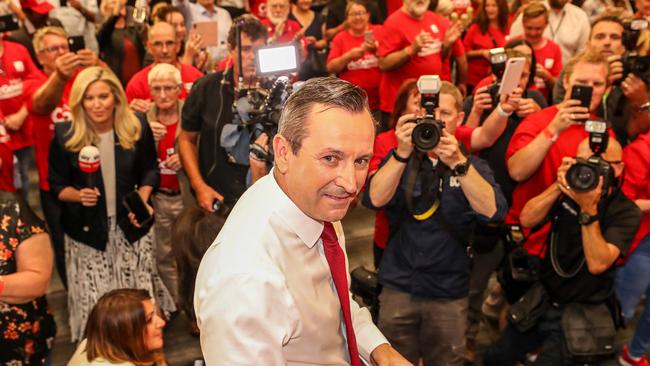
The Liberals look to have won only two seats in the 59-member Legislative Assembly, creating a coin toss for their next leader. The 34-year-old Zak Kirkup, picked just months ago to lead the party into the election, lost his seat and announced he’s retiring from politics after his one term in parliament. There goes the future.
The Nationals now have twice as many MPs as the Liberals and aren’t inclined to form a coalition. Unlike around the rest of the country, the Liberals and Nationals rarely do in WA.
Either way, Nationals leader Mia Davies will be the official Opposition Leader charged with trying to hold the re-elected McGowan government to account, leaving the two Liberals to play paper, rock, scissors in deciding who gets to be in charge of their duumvirate. Good governance requires good opposition to hold governments to account. McGowan will need to be careful not to fall victim to hubris because he won’t face much parliamentary opposition for the next four years. Labor is also on track to secure a majority in the state’s upper house, guaranteeing its ability to pass legislation. How on earth did it come to this? And what, if any, are the federal implications from Saturday’s historic results?
Liberal powerbrokers tapped former state leader Liza Harvey on the shoulder to stand aside in November. As a deputy premier in Colin Barnett’s government she was no lightweight. Neither was the leader she replaced halfway through 2019, Mike Nahan. He was Barnett’s treasurer for three years. So-called powerbrokers also partook in shoulder tapping on that occasion.
McGowan’s approval ratings since the beginning of the pandemic have hovered around the high 80s and low 90s — higher than all other premiers. His parochial WA border policies have been popular. He was never going to lose this election, which is why Kirkup conceded two weeks ago.
Where was the conservative strategy for saving the electoral furniture? More Liberal voters supported the Labor Party at this election than ever before in WA. Doing so was made infinitely easier by the decision to match a boy against a man. A political lightweight against a Premier oozing experience.
The only hope the Liberals had on Saturday of saving supposedly safe seats was with someone blue-blooded voters could consider a seasoned alternative. Like a Nahan or a Harvey. Instead, the geniuses at Liberal HQ handed the leadership to a novice in his first term whose only pre-parliamentary experience was political staffing.
Losing seats such as South Perth, Nedlands and Churchlands to Labor isn’t something I ever thought I would see.
By all accounts Kirkup had a lot to contribute over what should have been a 20-year career in parliament. Instead, he was elevated beyond his station too soon and has been chewed up and spat out by the Liberal Party.
McGowan might only be 53, but he’s been in state politics since 1996, gaining ministerial experience in the governments of Geoff Gallop and Alan Carpenter. Yet he’s always avoided factional Labor politicking, a contributing factor behind his soaring popularity. Don’t forget the cabal of Labor powerbrokers who tried to blast McGowan out of opposition leadership on the eve of the 2017 election, claiming he was “unelectable”. He went on to comprehensively beat Barnett before reducing the conservative side of politics to a rump on Saturday. How embarrassed they must be.
The results at state level contrast sharply with the federal sphere. The Liberals hold 11 of the 16 seats in WA, with Labor having failed to do any better than that in two decades. Scott Morrison will be rightly worried that the size of the state defeat might hamper the party’s organisational capacities in the west, putting seats such as Swan, Stirling and Hasluck at risk.
The Australian Electoral Commission releases its draft redistribution for WA this Friday, and we know one seat is to be abolished because of WA’s relative decline in population. The expectation is Christian Porter’s seat of Pearce might be the one to get the chop.
While state campaigns are usually fought on state issues with little correlation to events in Canberra, it is hard to escape the thought that the Morrison government’s woes of late made it harder for WA Liberals to engineer any sort of late campaign tightening in the polls.
Equally, there has been a confluence of state and federal political issues since the pandemic. WA voters like McGowan’s tough stance on borders, whereas the federal Liberals have been critical of his positioning on that. The Coalition government was planning to support Clive Palmer’s High Court challenge to border restrictions before the PM smelt the breeze and backed away.
With the Coalition holding on to the barest of majorities federally, and Labor’s McGowan re-elected in emphatic fashion, Anthony Albanese will be looking west for inspiration on how to overcome conservatives on their own turf. Because with the possible exception of Queensland, WA is the most conservative state in the commonwealth, and it just delivered the state conservatives a humiliating defeat.
Peter van Onselen is a professor of politics and public policy at the University of Western Australia.




Not since Julius Caesar uttered those immortal words “I came; I saw; I conquered” has a victory been so unequivocal. Mark McGowan’s WA Labor government was always going to win Saturday’s state election, but the size of the victory will reverberate for some time to come.